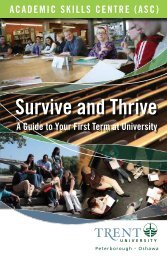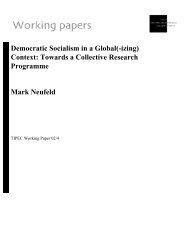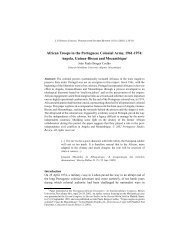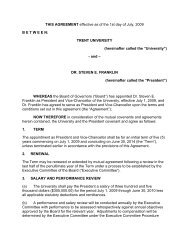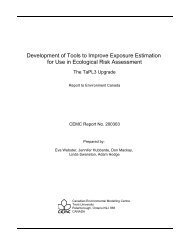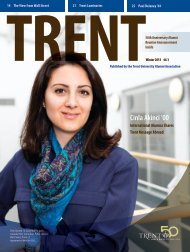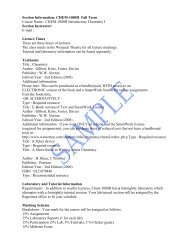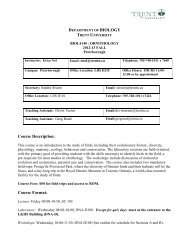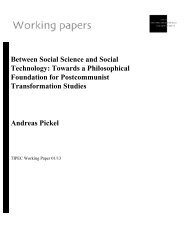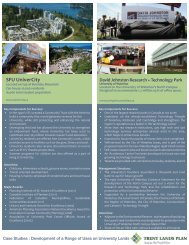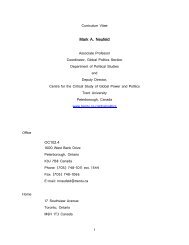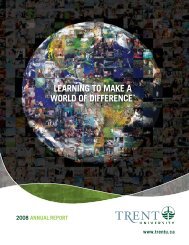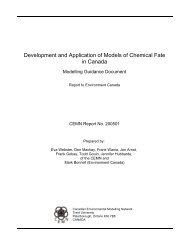Graduate academic calendar 2012 - 2013 - Trent University
Graduate academic calendar 2012 - 2013 - Trent University
Graduate academic calendar 2012 - 2013 - Trent University
Create successful ePaper yourself
Turn your PDF publications into a flip-book with our unique Google optimized e-Paper software.
GRADUATE PROGRAMS Applied Modelling & Quantitative Methods<br />
47<br />
member must have been identified who will supervise the student’s work. Prospective students must<br />
have a university course in differential and integral calculus, and one in probability and statistics<br />
or the equivalent. Students will also have some familiarity with linear algebra, and be capable<br />
of programming at an elementary level in at least one computational language. In addition, a<br />
course in either differential equations or advanced statistics is required, depending on whether the<br />
student’s area of research will be mathematics or statistics based. Students are involved both in<br />
course work and thesis research in their home discipline and in interdisciplinary study. Coursework<br />
in the foundations and methods of quantitative modelling and in their home discipline consists of<br />
about one-third of the work towards the degree. Each student must satisfactorily complete at least<br />
four one-term modelling courses, consisting of two courses in the foundations and mathematical<br />
aspects of modelling, and two courses in the home discipline. The required course work is normally<br />
completed in two terms, allowing the Summer sessions and the entire second year to be devoted to<br />
uninterrupted research. Students also participate in an interdisciplinary seminar on modelling and<br />
make one presentation each year. In this seminar the student discusses, in a way comprehensible to<br />
the audience, the system being modelled, the model developed and the means of validation of the<br />
model; here the emphasis is upon the modelling process itself rather than on the relevance of the<br />
results to the discipline of the research. Through this seminar the students develop the skills required<br />
to communicate with researchers outside their own discipline, and develop a perspective on their<br />
own and other disciplines not obtainable within a single-discipline context. Candidates are required<br />
to submit and be examined on a research thesis supervised by one of the core faculty listed above.<br />
Selection of the research topic is made by the student together with her/his supervisor and graduate<br />
supervisory committee (typically two or three core faculty members including the supervisor.) A<br />
grade of at least B- (70) must be obtained in each of the graduate courses. For further details, see<br />
Failed Course Policy. The expected time for completion of the degree is two years.<br />
FINANCIAL SUPPORT<br />
All students accepted are offered a teaching assistantship and a research fellowship. These stipends<br />
are frequently increased by research stipends provided from faculty’s research funds. The program<br />
also provides funds to cover minor overhead research costs such as laboratory and computing<br />
supplies, equipment and some conference travel. Canadian candidates are encouraged to apply,<br />
before the middle of October, for national and provincial scholarships (NSERC, SSHRC and OGS<br />
awards).<br />
For further information on financial support for graduate students, please refer to the graduate<br />
studies website: www.trentu.ca/graduatestudies/financialsupport.php.<br />
Not all courses will be available every year. Please consult www.trentu.ca/amod for<br />
information on courses that will be offered for the upcoming <strong>academic</strong> year.<br />
All courses listed are one-term courses. Students are normally required to take AMOD 5010H, 5020H,<br />
5610H and one of 5510H, 5710H or 5810H. Students with advanced preparation in the material<br />
covered in any of 5510H, 5610H or 5710H may appeal to take the corresponding advanced course<br />
instead: 5520H, 5620H, 5720H and 5820H respectively.<br />
AMOD 5010H, AMOD 5020H, AMOD 5030H<br />
Discipline-specific courses in the home department. These may be given by the research supervisor in<br />
a reading/project course format.<br />
AMOD 5510H – Statistical aspects of modelling<br />
Various statistical approaches to modelling are illustrated, with an emphasis on the applications of<br />
statistics within the social and natural sciences. The course discusses both univariate and multivariate<br />
procedures, with particular attention to the latter (e.g., multiple regression, multi-analysis of<br />
variance, exploratory factor analysis, confirmatory factor analysis, and path analysis). Prerequisite: As<br />
for AMOD 5610H, plus a university course in advanced statistics and some knowledge of SAS, SPSS<br />
or an alternative statistical application package.<br />
AMOD 5520H – Special topics in statistics of modelling<br />
Prerequisite: AMOD 5510H or equivalent.



